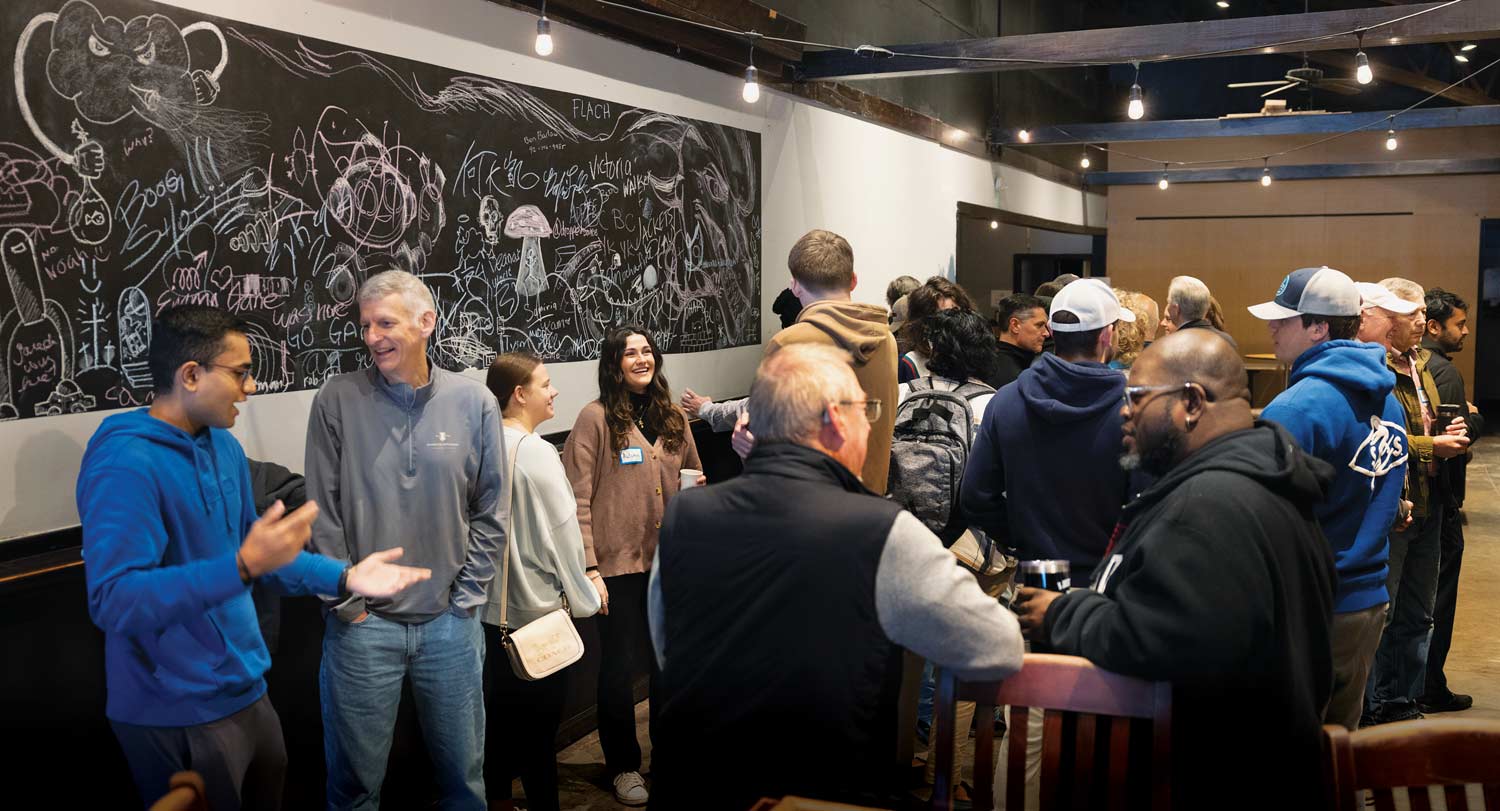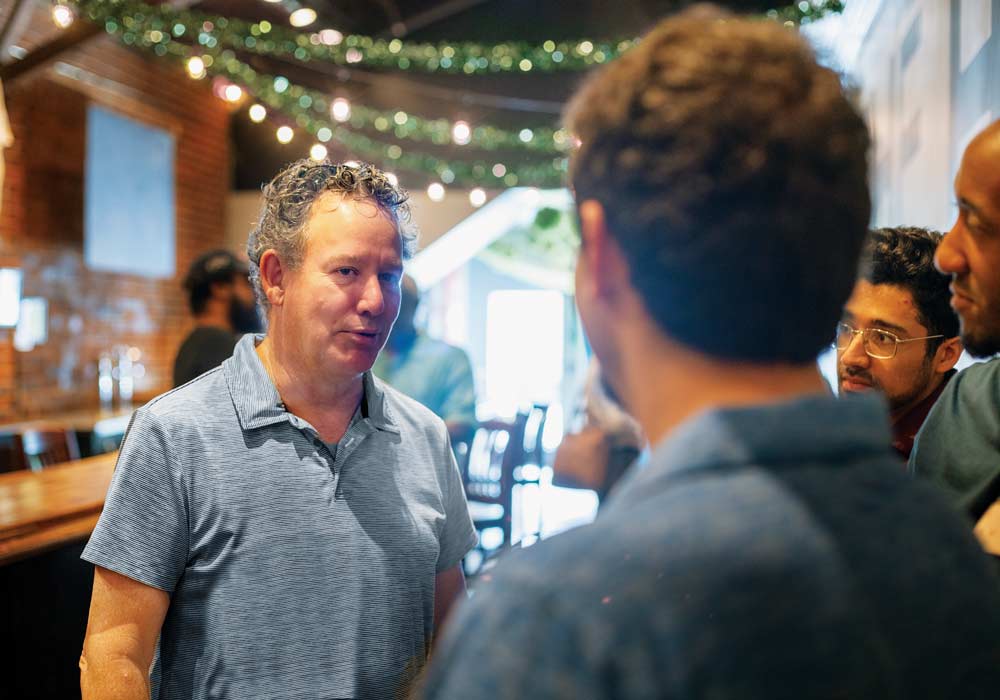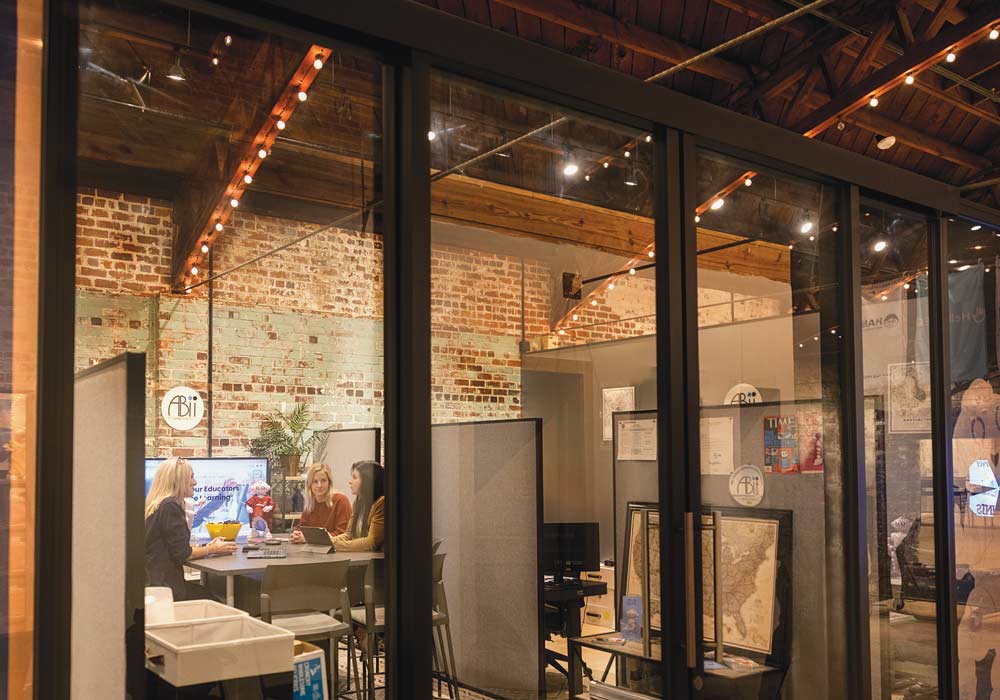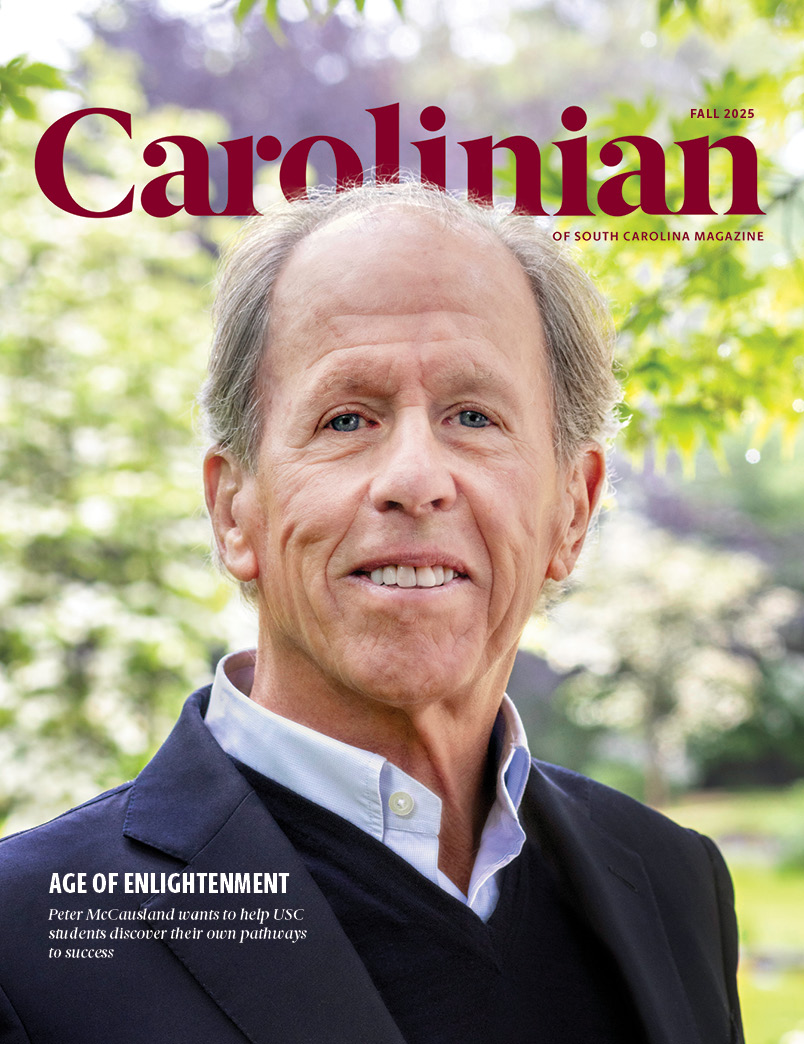
It’s 8 a.m. on a Wednesday, and the empty storefront at 711 Saluda Avenue is buzzing. Men and women in casual attire shake hands, eyeball name tags and add contacts to their phones. Some drop business cards on the bar that stretches down one wall.
Welcome to the Boyd Innovation Center, powered by GrowCo, a Columbia nonprofit that supports tech-focused entrepreneurs from around the Midlands. And welcome to Tech Beans, GrowCo’s weekly open house/coffee klatch.
The bare-bones room you’re navigating was once the White Mule, a Five Points music venue. Now, thanks to a $1 million grant from Columbia’s Boyd Foundation, it’s a temporary lobby for the coworking space located in the former taxi garage around back. For now, the two spaces are linked by a dark, jackknife hallway.
But coworking can wait. Right now, you’re eavesdropping on multiple conversations about Columbia’s tech potential. You’re meeting local leaders, students from USC’s Darla Moore School of Business and a range of entrepreneurs excited to see what happens when worlds collide.
You’re also meeting some of the folks behind GrowCo. Caroline Crowder, who holds a bachelor’s and a master’s degree from the Moore School, is executive director. She’s chatting with Richard Burts, ’87, the developer building out the physical space. Former interim director Joe Queenan was here a moment ago but disappeared down the hall.
And then there’s Chris Heivly, ’84, master’s in geography. The Durham, North Carolina-based serial entrepreneur was tapped by the Boyd Foundation to jumpstart the process. He’s not in Columbia every week, but he drives down often — for Tech Beans, for pitch nights or just to keep tabs.
“USC is my alma mater, there’s friends in town, and more importantly I care — a lot. I like to see positive change,” says Heivly, who previously helped downtown Durham reinvent itself as a tech hub. “Columbia is desperately behind peer cities in having this as part of their economy. Frankly, I like the challenge of figuring out how to crack that for this city.”

Chris Heivly during GrowCo’s weekly open house/coffee klatch.
If you crossed paths with Chris Heivly at USC, the onetime geography student may have escaped notice — not for lack of charisma but because he was focused on his career. “I approached college like a job,” he says. “And when I got to graduate school at USC, I was there to move ahead.”
And move ahead he did. As a co-founder and COO/board member at MapQuest, which sold to AOL for $1.9 billion in 1999, Heivly helped pave the way for modern geopositioning applications. He was already a budding entrepreneur, though he wouldn’t have described himself that way in the mid-80s.
“I didn’t even know what an entrepreneur was,” he says with a laugh. “I assumed I was going to work forthe federal government because that’s where all the cutting-edge research was being done in the application of computer mapping.”
And initially, that’s what he did — until MapQuest rerouted his thinking. In the early 90s, he explains, the Lancaster, Pennsylvania, company was a “mapmaking-for-hire” outfit. Their cartographers produced content for textbook companies, National Geographic, the National Parks Service and anyone else needing a physical map. Heivly was brought on to help computerize the process.
Then, a project to retool the interactive AAA TripTik road map concept triggered his imagination: What if they put an updated product onto a CD-ROM? Then later: What if they put it online? “I started to become what they now call an intrapreneur, someone who’s an entrepreneur inside a bigger entity,” he says.
“USC is my alma mater, there’s friends in town, and more importantly I care — a lot. I like to see positive change. Columbia is desperately behind peer cities in having this as part of their economy. Frankly, I like the challenge of figuring out how to crack that for this city.”
Opportunity unfolded from there. After leaving MapQuest, he charted a new course in the corporate world. He spent four years managing R.R. Donnelley’s venture capital subsidiary, 77 Capital, then moved to Rand McNally, where he was senior vice president for strategy and president of the company’s internet division.
But what stoked his imagination was imagination itself. He liked startup culture. He liked brainstorming, playing “What if?” with other creatives. He became a collaborator, a strategist, a serial entrepreneur.
“I’m a disruptor,” he says. “I like to find problems, break them down, fix them and leave whatever I’m doing better than when I came in.”
Heivly has been finding, breaking down and fixing problems for years, typically at companies with revenues between $1 million and $22 million.
“I went from being an entrepreneur to investing in other entrepreneurs to being parachuted into companies that are in their earliest stages and they’re stuck,” says Heivly. “An investor would say, ‘Hey, would you take over this company for a while and get them unstuck?’ I call it mentorship on steroids.
From 2011 to 2018, he co-managed The Startup Factory, an accelerator/venture fund that provided capital, three-day boot camps and a three-month mentorship program for early-stage startups.
In all, Heivly helped “unstick” 42 startups through The Startup Factory. And as he watched downtown Durham evolve from a rundown business district to a startup magnet, he learned something about pulling together constituents.
“It’s not just the programs but what you do to support the entrepreneurial community that’s interesting,” he says. “What levers do you pull to build a new part of your economy? How do you advance this organic, high-growth entrepreneur thing so it makes sense for that community?
Transforming a bar and retail district into a tech hub is no simple proposition in a capital city/college town like Columbia, which can be hamstrung by institutional mindsets. But shake those shackles, Heivly explains, and the plan is straightforward: Create the right conditions to attract the creative class, mentor your entrepreneurs then ride the ripple.
“For every high-growth, high-tech employee, you create 41/2 service jobs,” he says. “When I say I want to bring in 100-300 professionals over the next 1-2 years, imagine what that would do just in Five Points. I saw it happen in Durham, and there’s no reason it can’t happen here, not just in Five Points but throughout the city.”

Push through the glass door at the back of that dark hallway, and you’re in a brightly lit coworking space under a barrel vault ceiling. Van Robotics, a personalized learning tool company launched by CEO Laura Boccanfuso, occupies the first glass cube on your left. Posters of ABii, the educational robot that made the TIME Best Inventions list in 2020, decorate the walls. Boccanfuso, who earned a Ph.D. in computer science at USC in 2014, is on a Zoom call inside.
Five of the seven modular cubes are already leased, and GrowCo plans to install several smaller ones more suited to early-stage entrepreneurs. Common tables break up the cavernous room, which echoes with the voices of curious Tech Bean attendees who wander back for a peak. There are also reminders that this is a work in progress: a ladder against a wall, a toolbox on the floor, Burts passing through with a contractor.
But that flux only mirrors GrowCo’s larger philosophy. “You’ve got to have some level of structure, it can’t be complete chaos, but you also need an environment where entrepreneurs can flourish,” says Crowder. “One element of that is a little bit of chaos to experiment and try new things and test new ideas.”
Crowder, who was working for an edtech company in Singapore when she was lured back to the Palmetto State, was attracted by the job, but she was inspired by Heivly’s enthusiasm.
“I saw the work that Chris is doing here, and I believed in it,” she says. “I knew that Columbia could be changed, but it would take the right people in the right roles at the right time. There’s no guarantee of success, there never is, but Chris, in particular, is doing all he can to change Columbia’s culture.”
